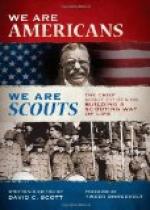The next day we were looking around, and we came upon two young men who said they were brothers, and they were so excited when we came near them that they could scarcely talk. They had been sinking a prospect hole and had just struck pay dirt.
We watched them pan out a couple of pans, and they certainly had struck it rich. After they had staked off their claims, Bridger asked them what name they would give their new discovery. They said, “There is a spring at the head of this ravine where we have often drunk and cooled ourselves, so we shall call our mine ‘Spring gulch,’” and I was told by miners afterwards that these brothers had surely found a rich mine, for it extended the whole length of the ravine.
I met one of the brothers a number of years after the time I saw them panning out the gold, and he told me that he and his brother took twenty thousand dollars apiece out of that mine.
The next day we were knocking around the mining camp, and we ran across a man whose name was Gregory. He was from Georgia, and he had just discovered a quartz lead which proved to be very rich in gold.
He showed us some of the quartz that he had taken from it, and we could see the gold all through the rock. He said that when he sank down a hundred feet, it would be twice as rich in gold as it was at the top.
There was a town built at this place, and it was called Gregory, and in two years there were a half a dozen quartz mills built in that vicinity and quite a number more quartz ledges had been discovered, and they all paid well.
We had been in this region about two weeks, when I met one of the men that came with Capt. McKee. We were both surprised to see each other. I asked him what he was doing, and he said he was mining. He said the whole company was mining together on a claim they had taken up on south Clear creek about twelve miles from Russel’s gulch, and they had fifty feet of sluice boxes and were taking out from five to seven dollars a day to a man, and had ground enough to last them two years.




